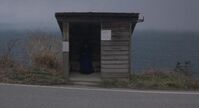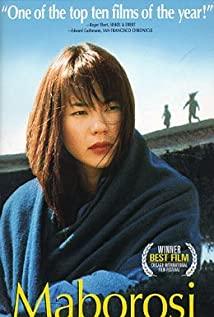In the first half of the movie, I thought I was going to tell the story of the family after their remarriage. They lived so happily that Yumiko could almost forget the past. A family of five sat on the porch in the hot summer, laughing happily for salted and unsalted watermelons, she sat behind them, looked at her happiness tenderly, smiled rarely, dressed in white.
However, Yumiko has no way to forget, no way not to think about it, and she has to go back and forth. So her clothes are always black, and the tone of the picture is always full of shadows. Therefore, when she is alone, she will often stop her work and look at somewhere in the void, as if looking at each other, as if recalling.
The trip back to Osaka was finally the last straw. The place where the husband and wife looked across the window was in ruins, and an old friend told her that the last time her husband appeared before his death, he still smiled as usual. why why why? The questioning fell into the void, and after all, there was no such person.
After returning from Osaka, the neighbor went to sea for a long time and did not return. At that time, I was as puzzled as his husband. After watching it, I recalled the tears she held back, and only then did I understand her horror and feel bitter. She could no longer bear the burden of watching others die. The neighbor finally came back and brought back the crab she asked for, and she hid in the kitchen, choking on her own.
The climax of the whole film finally appeared at the end, Yumiko loudly asked her husband why he could marry a woman like me? This question is also directed at himself. Unable to bear, she chose to run away, but she did not get into the long-distance car. She followed the funeral procession far behind, as if trying to identify death. Death, her nemesis, defeated her many times, but never showed her face. The husband who came to pick him up gave her an answer, "Phantom Light", which is the absurdity of life and the randomness of fate. Did she accept it? The director did not say it explicitly, and the story finally came to an end.
It was only towards the end that I realized that this film is still about her alone, how she said goodbye to the past, how she left the burden and moved on. At the end, she was wearing a white and blue dress, watching her husband and children frolic, and sighed with the old man, "It's really nice weather." The director used this cliché to give the answer. The waves of throwing stones into the water, so far, are flat after all.
View more about Maborosi reviews











